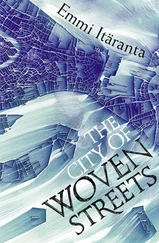There were always foods in our kitchen that many other villagers only had at Moonfeast or Midwinter celebrations, and almost no one else had a freezer. Did he have something to do with them – and had some of the books in the house come through his hands? Had he been keeping water patrols away so my father could continue to practise in peace? How much of this was his doing – and most importantly, how would things change if his protection was removed?
‘I will be careful,’ I said.
Heavy footsteps crossed the veranda, and there was a knock on the door.
‘That will be my driver,’ Bolin said. ‘I brought something for you. Come in!’ he shouted.
There was a clank, as something heavy was placed on the floor. I heard the door being eased open, wood scratching against wood, and a moment later the driver walked in. His face was very red, and he was carrying a large wooden chest, which he put down in front of me.
‘Open it,’ Bolin said.
I lifted the lid. Inside were dozens of old, leather-bound books.
‘I’ve no doubt that Taro found nothing of interest in them, or I wouldn’t have been able to get them back,’ he continued. ‘They’d have been destroyed if I hadn’t pulled the few strings that I still can. Think of it as my final favour to your father. I know how important these books were to him.’
Tears blurred my eyes again as I ran my fingers along the spines of the tea masters’ books. I recognised one as my father’s. He had not acquired a new one after the soldiers had taken it. Little else remained of him now.
‘Thank you,’ I said. ‘Thank you.’
Bolin’s face had a weary expression I could only interpret as sadness. The lamps glowed softly, and nothing looked different, but everything had changed.
‘I will still be attending the tea ceremonies, and I know you will be able to keep up the quality of your father’s work,’ Bolin said. He hesitated and then patted me clumsily on the shoulder.
‘I’d like to know one thing,’ I said. ‘Why did you bring Taro here last summer?’
I knew the accusation was clear behind my words. His answer surprised me.
‘I had no say in the matter. There is no power that lasts, Noria. Even mountains will eventually be worn down by wind and rain.’
He looked old and vulnerable, and I didn’t know what else to say to him. I saw him hesitate, just like I had a moment earlier.
‘There’s also something I would like to ask before I go,’ he said. ‘I understand you may not want to talk about it, but I’d like to know. How did Mikoa die?’
I was quiet. The day grew darker, the year turned slowly towards spring, water flowed in its stone-shell of the fell, and I was as cold as if my bones had turned into ice.
‘I don’t want to talk about it,’ I eventually said.
Bolin bowed low and left.
This is how it happens:
On the night of Moonfeast my father collapses to the floor, and he lies silent and still, while water and darkness creep into his clothes and hair and onto his skin.
Meanwhile, three unionists pour oil all over their clothes and hair and skin. Then they climb the stairs of the headquarters of the local military regime in Kuusamo and start the fire.
The next day an old couple from our village is taken away by men in blue uniforms, and by the evening everyone knows their son and two other people burned themselves as a protest against the Qianese occupation.
The weeping-song of the lament-women sweeps through the village for three days.
First there are more water guards each passing month. Then, just before the Midwinter celebrations, the water pipes are shut down altogether, and the only way to get water is to queue for rations on the central square.
The pod-news talks about tamed terrorism in the Scandinavian Union, about minor unrest in distant areas, fast-flaring and equally swiftly calmed riots in cities, as if the war is scattered, incidental, insignificant. Yet at the same time there is less and less food in the markets; passpods and visas are more difficult to get, and notifications about volunteers killed in battles are on the rise.
When the moon grows dark and new to mark the beginning of the year, my mother can’t come home because the railway connections are suspended.
I watch all this through my father’s illness, and while I see what is happening, it is like faint, shapeless mist at the edges of my life. My father is the centre holding it all: the pain chaining him that I can’t alleviate; his faltering life diminishing before my eyes that I can’t hold in the confines of the world. I let everything else pass by, even though I know I must face it later.
He lies in my parents’ bed, too wide for him alone, and his skin is sun-brittle paper, thinner every day. I can see the angles and arches of his bones through it.
Bolin tries to arrange medicines for him, but it is getting difficult even for military officers to find them. The doctor who comes shakes his head, sticks needles into his limbs, leaves and comes again, doesn’t know what is wrong with my father.
I think my mother’s absence gnaws on him, all change gnaws on him, and he just no longer has the strength to live.
Eventually he stops eating.
Eventually he stops drinking.
He knows, like in a dream you know that the other person in the room is familiar, even if you don’t know their face.
He orders me to prepare the last ritual.
He is my guest only once in his lifetime, and a tea master does not reveal any feelings in front of guests.
After he has finished the tea, he waits in the teahouse until death presses a hand on his heart and the water in his blood runs dry.
When Bolin hears what has happened, he arranges for a doctor from the military hospital to come and store the organs, because there is a shortage. When it is done, he sends a helicarriage for the body.
In the burial office I choose a bamboo coffin, which looks too small, and a silver-coloured urn, into which my father’s water will be gathered. The burial director tells me all will be ready in two days. I step back into the helicarriage and go to the baker’s shop to order the funeral cakes.
My mother is not here and she should be. There is no train she can board and no letter she knows will reach me, and every day I wake up hoping she is still breathing, even if I can’t feel it.
My father is not here and he should be. He is lying in a chamber of metal and stone, where the water that flowed in him is turning into ice and leaving him. After two days he will be nothing more than dust in a bamboo coffin and water in a silver-coloured urn.
I am here, and all words are mute ashes in my mouth, and no water will quench my thirst.
The queue dragged on at an agonisingly slow pace. The sun stung my eyes and my bare face was covered in the fine grit that the strong late-winter wind was whipping around. I regretted that I hadn’t unwrapped my insect hood in the morning. There weren’t many horseflies yet, but the sand clouds were no better. I kept glancing at the water-rationing point, which was still so very far away. I had other plans for the day and couldn’t wait to get out of the queue, but I knew I had to show my face at the village square at least twice a week in order not to appear suspicious.
I had walked to the fell first thing in the morning to check the surface level of the spring, and I had spent yesterday washing laundry and pruning gooseberry bushes in the still-bare garden and sowing vegetable seeds in burned-clay earthenware pots. Trying to keep the house as it had been while my father was still alive and my mother still lived at home felt like trying to catch wind between my palms. Dust gathered in thick, grey threads on the webs that spiders spun in the corners while I wasn’t looking. Long-legged, soft-winged insects that were the colour of dead leaves came seeking a faint glint of light inside the house and lost themselves in the maze of walls and closed spaces. Their dried bodies would crunch under my feet in unlit rooms, and I would find their lightweight debris slowly accumulating in places I had no time or energy to sweep often: twig-fragile legs, scale-glittery wings torn off hollow bodies, black-eyed heads with broken antennae twisted towards silence forever. The change was stronger and faster than me. The house was different, and my life was different, and I had to submit to it, even as my blood screamed against it.
Читать дальше
Конец ознакомительного отрывка
Купить книгу












